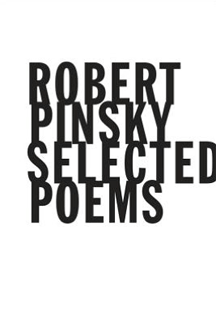By David Partenheimer
Pinsky’s Selected Poems is a sampling of his poetry from 1975 to 2007 presented in reverse chronological order. This book is an opportunity to become familiar with one of the most acclaimed and accomplished American poets of our time. From 1997 to 2000, Pinksy was the Poet Laureate of the United States. In Selected Poems, one can see the development and consistency of his work over thirty-two years. Moreover, one can gain a general insight into contemporary American poetry since Pinksy is an influential practitioner of a major movement in American poetry. Selected Poems shows the range of Pinsky’s poetry from a translation of lines from Dante to an alphabetical obituary list of his acquaintances in a prose poem.
Members of Phi Beta Kappa are especially qualified readers of Pinsky’s poetry because his material and images require a liberal arts background. Though he often presents himself as a people’s poet and founder of the Favorite Poem Project for broad public participation in poetry, his poetry requires extensive knowledge of the Classics, Bible, major literary works, and world history. Pinksy is at once a proletarian and erudite poet. He mixes ordinary language with literary allusions in the same poem and sometimes same line. This a part of Pinsky’s collage technique used to represent a panorama of ideas, emotions, and sensual impressions. Indeed, Pinsky’s main contribution to poetry is to the collage, a juxtaposition of disparate materials as they exist naturally in the world or as they are experienced in the poet’s mind. Though Pinsky presents some objective narrative and situations, most of his poems ensue from his subjective consciousness. Routinely, he presents an image or idea in the title or at the beginning of the poem, then he expands on it through free association or with theme and variation. However, most of his imagery involves the grotesque, suffering, and tragedy. In this context, it is understandable why Pinksy translated only Dante’s Inferno from the Divine Comedy. In any case, Pinsky’s poetic images and language are creative and free. He ruminates on everything in his mind from his political opinions to his memories of a pink piano. Most readers enjoy and appreciate his poetic musings though a few find them confusing.
Selected Poems shows Pinsky’s consistent and central concern with death and dying—poetry as memento mori. In this sense, he belongs to an ancient and unending tradition of poets and philosophers who see death as the fundamental context of life. More precisely, Pinsky’s poetry may express a secular view that death is an merely a destructive force. His earthy imagery speaks to this possibility. However, this observation is neither a condemnation nor praise of his poetry. The literary question is how he handles his material. Obviously, Pinsky expresses himself exceedingly well if one considers the volume of his prestigious awards and the range of his publications of poetry, essays, and translations. Anyone interested in contemporary American poetry should know Pinsky’s Selected Works.
David Partenheimer (ΦBK, University of Utah, 1971) is a professor of English at Truman State University and a resident member of the Delta of Missouri chapter of Phi Beta Kappa.




